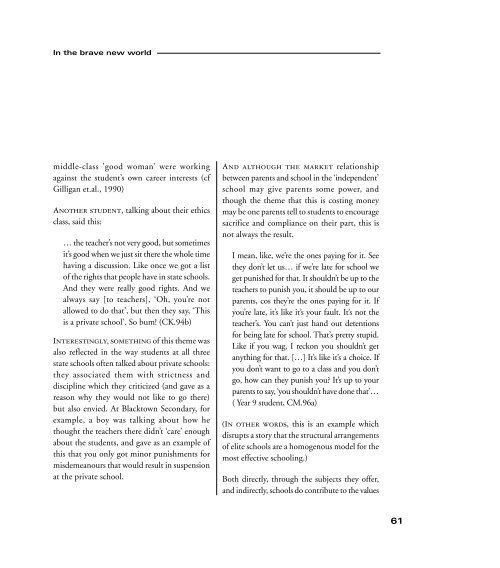Ladda ner utgåvan. - Fakultet för lärarutbildning - Umeå universitet
Ladda ner utgåvan. - Fakultet för lärarutbildning - Umeå universitet
Ladda ner utgåvan. - Fakultet för lärarutbildning - Umeå universitet
Create successful ePaper yourself
Turn your PDF publications into a flip-book with our unique Google optimized e-Paper software.
In the brave new world<br />
middle-class ’good woman’ were working<br />
against the student’s own career interests (cf<br />
Gilligan et.al., 1990)<br />
Another student, talking about their ethics<br />
class, said this:<br />
… the teacher’s not very good, but sometimes<br />
it’s good when we just sit there the whole time<br />
having a discussion. Like once we got a list<br />
of the rights that people have in state schools.<br />
And they were really good rights. And we<br />
always say [to teachers], ‘Oh, you’re not<br />
allowed to do that’, but then they say, ‘This<br />
is a private school’. So bum! (CK.94b)<br />
Interestingly, something of this theme was<br />
also reflected in the way students at all three<br />
state schools often talked about private schools:<br />
they associated them with strictness and<br />
discipline which they criticized (and gave as a<br />
reason why they would not like to go there)<br />
but also envied. At Blacktown Secondary, for<br />
example, a boy was talking about how he<br />
thought the teachers there didn’t ‘care’ enough<br />
about the students, and gave as an example of<br />
this that you only got minor punishments for<br />
misdemeanours that would result in suspension<br />
at the private school.<br />
And although the market relationship<br />
between parents and school in the ‘independent’<br />
school may give parents some power, and<br />
though the theme that this is costing money<br />
may be one parents tell to students to encourage<br />
sacrifice and compliance on their part, this is<br />
not always the result.<br />
I mean, like, we’re the ones paying for it. See<br />
they don’t let us… if we’re late for school we<br />
get punished for that. It shouldn’t be up to the<br />
teachers to punish you, it should be up to our<br />
parents, cos they’re the ones paying for it. If<br />
you’re late, it’s like it’s your fault. It’s not the<br />
teacher’s. You can’t just hand out detentions<br />
for being late for school. That’s pretty stupid.<br />
Like if you wag, I reckon you shouldn’t get<br />
anything for that. […] It’s like it’s a choice. If<br />
you don’t want to go to a class and you don’t<br />
go, how can they punish you? It’s up to your<br />
parents to say, ‘you shouldn’t have done that’…<br />
( Year 9 student, CM.96a)<br />
(In other words, this is an example which<br />
disrupts a story that the structural arrangements<br />
of elite schools are a homogenous model for the<br />
most effective schooling.)<br />
Both directly, through the subjects they offer,<br />
and indirectly, schools do contribute to the values<br />
61

















